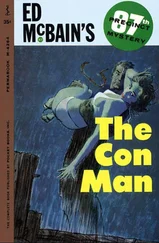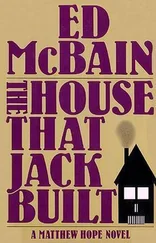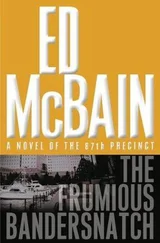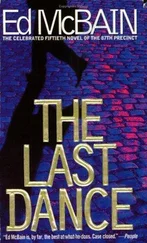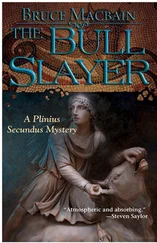Ed Mcbain - The Heckler
Здесь есть возможность читать онлайн «Ed Mcbain - The Heckler» весь текст электронной книги совершенно бесплатно (целиком полную версию без сокращений). В некоторых случаях можно слушать аудио, скачать через торрент в формате fb2 и присутствует краткое содержание. Жанр: Полицейский детектив, на английском языке. Описание произведения, (предисловие) а так же отзывы посетителей доступны на портале библиотеки ЛибКат.
- Название:The Heckler
- Автор:
- Жанр:
- Год:неизвестен
- ISBN:нет данных
- Рейтинг книги:4 / 5. Голосов: 1
-
Избранное:Добавить в избранное
- Отзывы:
-
Ваша оценка:
- 80
- 1
- 2
- 3
- 4
- 5
The Heckler: краткое содержание, описание и аннотация
Предлагаем к чтению аннотацию, описание, краткое содержание или предисловие (зависит от того, что написал сам автор книги «The Heckler»). Если вы не нашли необходимую информацию о книге — напишите в комментариях, мы постараемся отыскать её.
The Heckler — читать онлайн бесплатно полную книгу (весь текст) целиком
Ниже представлен текст книги, разбитый по страницам. Система сохранения места последней прочитанной страницы, позволяет с удобством читать онлайн бесплатно книгу «The Heckler», без необходимости каждый раз заново искать на чём Вы остановились. Поставьте закладку, и сможете в любой момент перейти на страницу, на которой закончили чтение.
Интервал:
Закладка:
Carella was forced to admit that the police were dealing with a criminal element which, in a very real sense, was amateurish. They qualified for professional status only in that they worked—if you will excuse the term when applied to crime—for money. And he was forced to admit further that the police opposing this vast criminal army were also attacking their job in a somewhat amateurish way, largely because nothing more demanding was called for.
Well, this deaf man whoever he was, was making further demands. He was elevating crime to a professional level, and if he were not met on equally professional terms, he would succeed. The entire police force could sit around with its collective thumb up its collective ass, and the deaf man would run them ragged and carry home the bacon besides.
Which made Carella wonder about his own role as a cop and his own duties as an enforcer of the law. He was a man dedicated to the prevention of crime, or failing that, to the apprehension of the person or persons committing crime. If he totally succeeded in his job, there would be no more crime and no more criminals; and, carrying the thought to its logical conclusion, there would also be no more job. If there was no crime, there would be no need for the men involved in preventing it or detecting it.
And yet somehow this logic was illogical, and it led Carella to a further thought which was as frightening as the sudden clarity he was experiencing.
The thought sprang into his head full-blown: If there is no crime, will there be society?
The thought was shocking—at least to Carella it was. For society was predicated on a principle of law and order, of meaning as opposed to chaos. But if there were no crime, if there were in effect no lawbreakers, no one to oppose law and order, would there be a necessity for law? Without lawbreakers, was there a need for law? And without law, would there be lawbreakers?
MADAM, I’MADAM.
Read it forwards or backwards and it says the same thing. A cute party gag, but what happens when you say, “Crime is symbiotic with society,” and then reverse the statement so that it reads, “Society is symbiotic with crime?”
Carella lay in the blackness of his delirium, not knowing he was up against a logician and a mathematician, but intuitively reasoning in mathematical and logical terms. He knew that something more was required of him. He knew that in this vast record of day-by-day crime, this enormous never-ending account of society and the acts committed against it, something more was needed from him as a cop and as a man. He did not know what that something more was, nor indeed whether he could ever make the quantum jump from the cop and man he now was to a cop and man quite different.
Clarity suffused the darkness of his coma.
In the clarity, he knew he would live.
And he knew that someone was in the room with him, and he knew that this person must be told about the Mercantile Trust Company and the Uhrbinger Construction Company and the blueprint he had seen in the Franklin Street apartment.
And so he said, “Merc-uh-nuh,” and he knew he had not formed the word correctly and he could not understand why because everything seemed so perfectly clear within the shell of his dark cocoon.
And so he tried the other word, and he said, “Ubba-nuh coston,” and he knew that was wrong, and he tried again, “Ubba-nuh…ubba…Uhrbinger…Uhrbinger,” and he was sure he had said it that time, and he leaned back into the brilliant clarity and lost consciousness once more.
The person in the room with him was Teddy Carella, his wife.
But Teddy was a deaf mute, and she watched her husband’s lips carefully, and she saw the word “Uhrbinger” form on those lips, but it was not a word in her vocabulary, and so she reasoned that her husband was delirious.
She took his hand and held it in her own, and then she kissed it and put it to her cheek.
The hospital lights went out suddenly.
The bombs Pop had set at Eastern Electric were beginning to go off.
RAFE, LIKE ANYgood surgeon, had checked his earlier results before making his final incision. He had run a Tong Tester over the wires in the box once more, checking the wires which carried the current, nodding as they tallied with the calculations he had made the first time he looked into the box.
“Okay,” he said, apparently to the deaf man who was standing below him, but really to no one in particular, really a thinking out loud. “Those are the ones carrying the juice, all right. I cross-contact those and cut the others, and it’s clear sailing.”
“All right, then do it,” the deaf man said impatiently.
Rafe set about doing it.
He accomplished the cross-contact with speed and efficiency. Then he thrust his hand at the deaf man. “The clippers,” he said.
The deaf man handed them up to him. “What are you going to do?”
“Cut the other wires.”
“Are you sure you’ve done this right?”
“I think so.”
“Don’t think!” the deaf man said sharply. “Yes or no? Is that damn alarm going to go off when you cut those wires?”
“I don’t think so.”
“Yes or no?”
“No,” Rafe said. “It won’t go off.”
“All right,” the deaf man said. “Cut them.”
Rafe took a deep breath and moved the clippers toward the wires. With a quick, deliberate contraction of his hand, he squeezed the handles of the clippers together and cut the wires.
The alarm did not go off.
AT THE HOUSEin Majesta, Chuck paced the floor nervously while Pop studied the alarm clock sitting on the dresser.
“What time is it?” Chuck asked.
“Five-thirty.”
“They should be out of the bank and on their way by now.”
“Unless something went wrong,” Pop said.
“Yeah,” Chuck answered distractedly, and he began pacing the floor again. “Put on that radio, will you?” he said.
Pop turned it on.
“…raging out of control along a half-mile square of waterfront,” the announcer said. “Every available piece of fire equipment in the city has been rushed to the disaster area in an effort to control the flames before they spread further. The rain is not helping conditions. Slippery streets seem to be working against the men and apparatus. The firemen and police are operating only from the lights of their trucks, an explosion at the Eastern Electric Company having effectively blinded seventy per cent of the area’s streets, homes and businesses. Fortunately, there is still electric power in Union Station where an explosion on track twelve derailed the incoming Chicago train as a bomb went off simultaneously in the waiting room. The fire in the baggage room there was brought under control, but is still smoldering.”
The announcer paused for breath.
“In the meantime, the Mayor and the Police Commissioner are still in secret session debating whether or not to call out the National Guard in this emergency situation, and there are several big questions that remain unanswered: What is happening? Who is responsible for this? And why? Those are the questions in the mind of every thinking citizen as the city struggles for its very survival.”
The announcer paused again.
“Thank you, and good night,” he said.
Pop turned off the radio.
He had to admit he felt a slight measure of pride.
THEY CAME OUTof the vault and through the tunnel at 5:40P.M . They made three trips back and forth between the bank vault and the basement of the store, and then they carried the cartons stuffed with money to the truck. They opened the door to the refrigerator compartment and shoved the cartons inside. Then they closed the refrigerator door, and Rafe started the truck.
Читать дальшеИнтервал:
Закладка:
Похожие книги на «The Heckler»
Представляем Вашему вниманию похожие книги на «The Heckler» списком для выбора. Мы отобрали схожую по названию и смыслу литературу в надежде предоставить читателям больше вариантов отыскать новые, интересные, ещё непрочитанные произведения.
Обсуждение, отзывы о книге «The Heckler» и просто собственные мнения читателей. Оставьте ваши комментарии, напишите, что Вы думаете о произведении, его смысле или главных героях. Укажите что конкретно понравилось, а что нет, и почему Вы так считаете.



